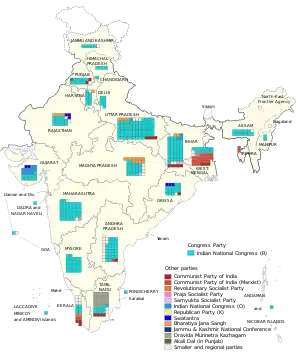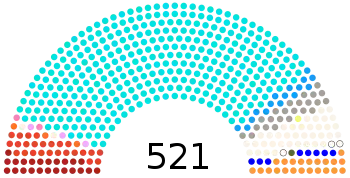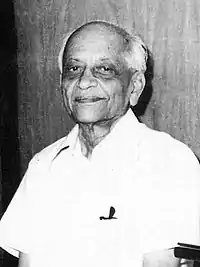1971 Indian general election
General elections were held in India between 1 and 10 March 1971 to elect members of the fifth Lok Sabha. They were the fifth general elections since independence in 1947. The 27 Indian states and union territories were represented by 518 constituencies, each with a single seat.[2] Under the leadership of Indira Gandhi, the Indian National Congress (R) led a campaign which focused on reducing poverty and won a landslide victory, overcoming a split in the party and regaining many of the seats lost in the previous election.[3]
| ||||||||||||||||||||||||||||||||||||||||||||||||||||||||||||||||||||
518 of the 521 seats in the Lok Sabha 260 seats needed for a majority | ||||||||||||||||||||||||||||||||||||||||||||||||||||||||||||||||||||
|---|---|---|---|---|---|---|---|---|---|---|---|---|---|---|---|---|---|---|---|---|---|---|---|---|---|---|---|---|---|---|---|---|---|---|---|---|---|---|---|---|---|---|---|---|---|---|---|---|---|---|---|---|---|---|---|---|---|---|---|---|---|---|---|---|---|---|---|---|
| Registered | 274,189,132 | |||||||||||||||||||||||||||||||||||||||||||||||||||||||||||||||||||
| Turnout | 55.27% ( | |||||||||||||||||||||||||||||||||||||||||||||||||||||||||||||||||||
| ||||||||||||||||||||||||||||||||||||||||||||||||||||||||||||||||||||
 Results by constituency | ||||||||||||||||||||||||||||||||||||||||||||||||||||||||||||||||||||
| ||||||||||||||||||||||||||||||||||||||||||||||||||||||||||||||||||||
Background
Congress party split
During her previous term, there had been internal divisions in the Indian National Congress between Indira Gandhi and the party establishment, especially Morarji Desai. In 1969, she was expelled from the party, causing a split. Most of the Congress MPs and grassroots support joined Gandhi's INC(R) faction, which was recognised by the Election Commission as being the successor to the previous party. 31 MPs who opposed Gandhi formed Indian National Congress (Organisation) party.
Minority government
The Second Indira Gandhi government, formed in November 1969 and dissolved in March 1971, was the first minority government in independent India. After the split, the INC(R) held 221 seats in the 523-seat parliament, 41 seats short of a majority. However, Gandhi and her cabinet remained in power by relying on outside support from the Communists who had 42 seats and the Dravida Munnetra Kazhagam which had 26 seats, giving the government a total of 289 seats, a comfortable majority and far more than the minimum of 262 seats required for a majority. Knowing that her minority government would eventually fall, on 27 December 1970, President V.V. Giri dissolved the Lok Sabha at the recommendation of Gandhi.
Opposition alliance
INC(O) formed a pre-poll alliance with Samyukta Socialist Party (SSP), Praja Socialist Party (PSP), the Swatantra Party and Bharatiya Jana Sangh BJS and several other regional parties opposed to the INC(R). They agreed to field one candidate against the INC(R) candidate in every constituency in order to defeat Gandhi's party.
Results
Despite the split, the ruling faction gained votes and seats to win a strong majority, while the Grand Alliance was badly trounced and lost more than half of their seats.
 | |||||
|---|---|---|---|---|---|
| Party | Votes | % | Seats | +/– | |
| Indian National Congress (R) | 64,033,274 | 43.68 | 352 | +69 | |
| Indian National Congress (Organisation) | 15,285,851 | 10.43 | 16 | New | |
| Bharatiya Jana Sangh | 10,777,119 | 7.35 | 22 | –13 | |
| Communist Party of India (Marxist) | 7,510,089 | 5.12 | 25 | +6 | |
| Communist Party of India | 6,933,627 | 4.73 | 23 | 0 | |
| Dravida Munnetra Kazhagam | 5,622,758 | 3.84 | 23 | –2 | |
| Swatantra Party | 4,497,988 | 3.07 | 8 | –36 | |
| Samyukta Socialist Party | 3,555,639 | 2.43 | 3 | –20 | |
| Bharatiya Kranti Dal | 3,189,821 | 2.18 | 1 | New | |
| Telangana Praja Samithi | 1,873,589 | 1.28 | 10 | New | |
| Praja Socialist Party | 1,526,076 | 1.04 | 2 | –11 | |
| Shiromani Akali Dal | 1,279,873 | 0.87 | 1 | New | |
| Utkal Congress | 1,053,176 | 0.72 | 1 | New | |
| All India Forward Bloc | 962,971 | 0.66 | 2 | 0 | |
| Peasants and Workers Party of India | 741,535 | 0.51 | 0 | –2 | |
| Revolutionary Socialist Party | 724,001 | 0.49 | 3 | New | |
| Republican Party of India (Khobragade) | 542,662 | 0.37 | 0 | New | |
| Kerala Congress | 542,431 | 0.37 | 3 | +3 | |
| Bangla Congress | 518,781 | 0.35 | 1 | –4 | |
| Indian Union Muslim League | 416,545 | 0.28 | 2 | 0 | |
| Vishal Haryana Party | 352,514 | 0.24 | 1 | New | |
| All India Jharkhand Party | 272,563 | 0.19 | 1 | New | |
| Shiv Sena | 227,468 | 0.16 | 0 | New | |
| Shoshit Dal Bihar | 193,389 | 0.13 | 0 | New | |
| Socialist Unity Centre of India | 157,703 | 0.11 | 0 | New | |
| Republican Party of India | 153,794 | 0.10 | 1 | 0 | |
| Janta Party | 139,091 | 0.09 | 0 | New | |
| All Party Hill Leaders Conference | 90,772 | 0.06 | 1 | 0 | |
| United Front of Nagaland | 89,514 | 0.06 | 1 | New | |
| Hindu Mahasabha | 73,191 | 0.05 | 0 | New | |
| Akhil Bharatiya Gorkha League | 72,131 | 0.05 | 0 | New | |
| Bihar Prant Hul Jharkhand | 66,669 | 0.05 | 0 | New | |
| Hindustani Shoshit Dal | 65,925 | 0.04 | 0 | New | |
| Revolutionary Communist Party of India | 65,622 | 0.04 | 0 | New | |
| Lok Sewak Sangh | 62,527 | 0.04 | 0 | New | |
| Jana Congress | 60,103 | 0.04 | 0 | 0 | |
| Nagaland Nationalist Organisation | 58,511 | 0.04 | 0 | –1 | |
| United Goans – Seqveria Group | 58,401 | 0.04 | 1 | 0 | |
| Socialist Party | 55,064 | 0.04 | 0 | New | |
| Maharashtrawadi Gomantak Party | 54,597 | 0.04 | 0 | New | |
| Proutist Bloc of India | 43,849 | 0.03 | 0 | New | |
| Telangana Congress | 43,548 | 0.03 | 0 | New | |
| Minorities Labour Party | 41,198 | 0.03 | 0 | New | |
| Indian Socialist Party | 38,713 | 0.03 | 0 | New | |
| Muslim Majlis Uttar Pradesh | 36,526 | 0.02 | 0 | New | |
| Lok Raj Party Himachal Pradesh | 34,070 | 0.02 | 0 | New | |
| Uttar Pradesh Kisan Mazdoor Party | 31,729 | 0.02 | 0 | New | |
| Manipur Peoples Party | 31,029 | 0.02 | 0 | New | |
| Akhil Bharatiya Ram Rajya Parishad | 24,093 | 0.02 | 0 | New | |
| Republican Party of India (Ambedkarite) | 22,428 | 0.02 | 0 | New | |
| Backward Classes Mahasabha | 6,929 | 0.00 | 0 | New | |
| Revolutionary Socialist Party of India (Marxist–Leninist) | 6,198 | 0.00 | 0 | New | |
| Chota Nagpur Bhumi Rakshak Party | 4,982 | 0.00 | 0 | New | |
| Independents | 12,279,629 | 8.38 | 14 | –21 | |
| Appointed members[lower-alpha 1] | 3 | 0 | |||
| Total | 146,602,276 | 100.00 | 521 | –2 | |
| Valid votes | 146,602,276 | 96.74 | |||
| Invalid/blank votes | 4,934,526 | 3.26 | |||
| Total votes | 151,536,802 | 100.00 | |||
| Registered voters/turnout | 274,189,132 | 55.27 | |||
| Source: ECI | |||||
- Two representing Anglo-Indians and one representing the North-East Frontier Agency.
Results by state
| State | Total seats |
Seats won | |||||||||||||
|---|---|---|---|---|---|---|---|---|---|---|---|---|---|---|---|
| INC (R) | CPM | CPI | DMK | BJS | INC (O) | TPS | SWA | SSP | PSP | BKD | Others | Ind. | App. | ||
| Andaman and Nicobar Islands | 1 | 1 | |||||||||||||
| Andhra Pradesh | 41 | 28 | 1 | 1 | 10 | 1 | |||||||||
| Assam | 14 | 13 | 1 | ||||||||||||
| Bihar | 53 | 39 | 5 | 2 | 3 | 2 | 1 | 1 | |||||||
| Chandigarh | 1 | 1 | |||||||||||||
| Dadra and Nagar Haveli | 1 | 1 | |||||||||||||
| Delhi | 7 | 7 | |||||||||||||
| Goa, Daman and Diu | 2 | 1 | 1 | ||||||||||||
| Gujarat | 24 | 11 | 11 | 2 | |||||||||||
| Haryana | 9 | 7 | 1 | 1 | |||||||||||
| Himachal Pradesh | 4 | 4 | |||||||||||||
| Jammu and Kashmir | 6 | 5 | 1 | ||||||||||||
| Kerala | 19 | 6 | 2 | 3 | 7 | 1 | |||||||||
| Laccadive, Minicoy, and Amindivi Islands | 1 | 1 | |||||||||||||
| Madhya Pradesh | 37 | 21 | 11 | 1 | 4 | ||||||||||
| Maharashtra | 45 | 42 | 1 | 2 | |||||||||||
| Manipur | 2 | 2 | |||||||||||||
| Mysore | 27 | 27 | |||||||||||||
| Nagaland | 1 | 1 | |||||||||||||
| North-East Frontier Agency | 1 | 1 | |||||||||||||
| Orissa | 20 | 15 | 1 | 3 | 1 | ||||||||||
| Punjab | 13 | 10 | 2 | 1 | |||||||||||
| Pondicherry | 1 | 1 | |||||||||||||
| Rajasthan | 23 | 14 | 4 | 3 | 2 | ||||||||||
| Tamil Nadu | 39 | 9 | 4 | 23 | 1 | 1 | 1 | ||||||||
| Tripura | 2 | 2 | |||||||||||||
| Uttar Pradesh | 85 | 73 | 4 | 4 | 1 | 1 | 2 | ||||||||
| West Bengal | 40 | 13 | 20 | 3 | 1 | 2 | 1 | ||||||||
| Anglo-Indians | 2 | 2 | |||||||||||||
| Total | 521 | 352 | 25 | 23 | 23 | 22 | 16 | 10 | 8 | 3 | 2 | 1 | 19 | 14 | 3 |
| Source: ECI | |||||||||||||||
Aftermath
On 12 June 1975, the Allahabad High Court invalidated the result in Gandhi's constituency on the grounds of electoral malpractices. Instead of resigning, Indira Gandhi called a state of emergency, suspending democracy and outlawed political opposition. After democracy was restored in 1977, the opposition Congress faction formed a coalition of parties called the Janata Party, which inflicted the Congress' first electoral defeat.
See also
References
- India Inter-Parliamentary Union
- "General Election of India 1971, 5th Lok Sabha" (PDF). Election Commission of India. p. 6. Archived from the original (PDF) on 18 July 2014. Retrieved 13 January 2010.
- "INKredible India: The story of 1971 Lok Sabha election - All you need to know". Zee News. 7 March 2019. Retrieved 3 December 2020.



.jpg.webp)
.jpg.webp)